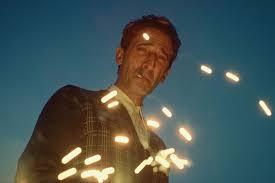Adrien Brody is on a roll. Following his Golden Globe and BAFTA Best Actor wins for his performance as László Toth in Brady Corbet's The Brutalist, Brody picked up the equivalent Oscar last Sunday, celebrating it by giving the longest speech in Academy Awards history. Two days later, he was nominated for an Olivier for his portrayal of the real-life death-row inmate Nick Yarris in The Fear of 13, Lindsey Ferrentino's play at the Donmar having marked the 51-year-old actor’s British stage debut.
The Oscar was Brody’s second. In 2003, he became the youngest winner in the Best Actor category for his turn as a Holocaust survivor in Roman Polanski's The Pianist. Despite the awards, Brody has not been particularly good at maintaining stardom. It's not in his nature – he's too earnest, too serious, too unstarry, which is much to his credit.
Corbet's historical epic depicts forty years in the life of Toth, a Hungarian Jew and survivor of the Nazi regime. Seemingly broken after his ordeal in the Buchenwald concentration camp, he arrives in New York City and promptly sets about chasing the American Dream as a formative brutalist architect in Philadelphia. It is a role that resonates deeply with Brody, as he explained in an interview shortly after the film had its premiere at the Venice Film Festival last September.
PAMELA JAHN: What is your genaral relationship with architecture and the Brutalist movement in particular?
ADRIEN BRODY: I grew up in the home of artists, and I view my work as an actor as a pursuit of an artistic expression. I paint, I've renovated old building structures, and I do have a passion for visual, tactile, and sensorial artistic experiences. In that sense, I've always been fascinated by architecture. It's another art form. And I greatly appreciated brutalism, even before this film. I remember being in Prague, where I would see these structures and marvel at them. I'm drawn to the rawness and the audacity and the evocative nature in a lot of brutalist designs, and what transpired from it after the mid-century, and I also like the simple elegance and practicality in a lot of that.
Do you consider yourself to be a minimalist?
At times. I'm very eclectic. I like gothic works, I like art nouveau, I like minimalism, and I like eastern influences. I'm also a fan of Greek revival homes. It just depends on how I'm feeling. But I do, personally, feel if the environments aren't too cold, I can be most creatively open in a minimalistic space. What I gravitate to is to be infused by all the things that I've experienced in my life. I have incorporated different elements, including minimalistic spaces, within the work that I've helped to create.
In László Toth's life, desperation and brilliance seem to go hand in hand. Is that the destiny of any true artist, do you think?
No, I don't think desperation is necessarily a stepping stone to discovering a true artistic vision or delivering greatness. But, unfortunately, many artists are using a form of creative expression as a pathway through past traumatic experiences or their inability to come to terms with the circumstances that feel wrong around them, and that fuels a need to express it other than in words. What is important to acknowledge here is that Laszlo's monumental achievements represent a trauma and the pain of an era that is being shed and honoured and immortalised and subversively re-established in this indelible way.
In 2002, at the age of 29, you won an Oscar for your performance as a Holocaust survivor in The Pianist. Did you draw on that experience in The Brutalist?
László is a very different character in a different circumstance. The story of Władysław Szpilman, a Polish Jewish pianist, was very specific. I felt a huge weight on my shoulders to represent a real person and reflect both the cruelty and the impact of the Holocaust. In The Brutalist, on the other hand, it's about an immigrant's life and leaving all the torments of the past behind. In that respect alone, the role is much more personal to me.
You have Polish-Jewish and Hungarian roots yourself. Your mother, a photographer, emigrated to the U,S. during the Hungarian Revolution of 1956.
Yes, much like László, she lost her home and followed her dream of becoming an artist. I understand very well the impact this has had on her life and creative work. But my grandparents are also immigrants. Their painful experiences of fleeing from war and starting over in a foreign country have shaped me in equal measure, not only in terms of this role. Their escape to America made it possible for me as a young actor to pursue my passion and practice my craft. Had I grown up in Hungary, my life would have been very different today.
How would you describe the relationship between you and your mother on an artistic level?
She's my mentor, always has been. In fact, both my parents were always role models for me as people, as human beings. It was quite a profound experience for them to see the film. But I also wondered what my grandfather would have thought. My mother's father always dreamt of becoming an actor. He actually had a brief engagement on Broadway, in a very minor role. But when he gave the director notes, he was fired. I will always remember that.















Add comment